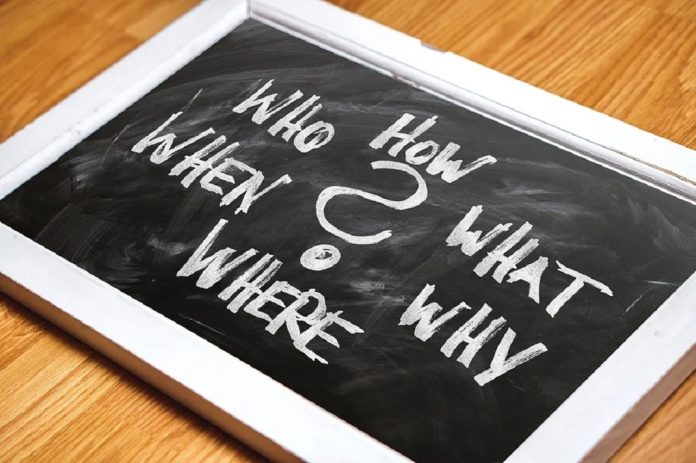by Carthage Buckley, Stress and Performance Coach
I love questions. They are the most overlooked tool in just about every area of life. If you are brave enough to question yourself and question others, you will learn more than you thought possible. Instead, whenever things go wrong, most people curse their look or turn the finger of blame towards others or themselves. But how can you blame anybody else before you have really examined what happened? It reminds me of the police dramas where the ‘dumb’ cop has made up his mind about who is guilty until the ‘clever’ cop turns up and shows him how to properly examine the evidence to come to the right conclusion. That is how you solve the real problem. You ask smart questions to gather all the evidence you need to come to a truthful conclusion.
My profession, coaching, is all about asking smart questions. The coach works off the principle that the client has all the answers inside of them. It is just a matter of asking smart questions to help the client unlock those answers.
I vividly remember an incident earlier this year when a client had a specific problem. She was convinced that she didn’t know how to solve the problem. I asked her what I believed to be a smart question and suddenly she started talking in a steady flow. Within a couple of minutes, she had outlined a great solution to the biggest problem she was facing. I smiled, and she smiled as we both realised that she now knew that the solutions to her problems lay inside of her. When I asked the question, I stepped back and allowed her to speak her thoughts. The question encouraged her to thoroughly examine her thoughts and when she did, she unlocked a great intelligence which she had always possessed.
Everyone has some unlocked knowledge within themselves. Because they have never really asked themselves for that knowledge, it has never presented itself to them. All it takes is to ask the right question. So, next time you find yourself facing a problem, don’t just jump to conclusions. Ask yourself smart questions to start yourself thinking then let your thoughts flow. You will discover that you have knowledge you hadn’t realised you possessed.
5 Smart questions for problem solving
There are many questions you can ask yourself when facing a problem and they will do a great job. For the purposes of this article I have picked a few of my favourites. There is no particular order for asking these questions.
Note: I have framed these questions in a way where you ask yourself but you can obviously use the same questions with others.
1. What am I pretending not to know?
I first encountered this question in an amazing book called ‘Fierce Conversations’ by Susan Scott. I like this question because it addresses one of the most common issues I have come across during my coaching career i.e. people who would rather pretend a problem doesn’t exist than face the difficult task of dealing with the problem.
Many of the problems you experience in life can be difficult and scary to deal with. But if you don’t deal with them, they get worse, to the point where you are eventually going to have to deal with them. Of course, if you take this approach, the problem is going to be much bigger and more difficult to deal with it by the time you do eventually pluck up the courage.
It is always better to deal with a problem as soon as it shows up. To do this, you need to have the courage to acknowledge the problem. Stop pretending you don’t know about it, grab the bull by the horns and start solving that problem.
2. What have I tried?
Seems like a very simple question and it should be easy to answer. For many people, it will be easy to answer but in many cases, it highlights the fact that you haven’t really tried anything. Many people will spend forever complaining about a problem. They will tell anybody that will listen and many more who don’t want to listen. But when it comes to trying to solve the problem, they go all silent.
When you ask yourself what you have tried to solve the problem, you may find that you can’t name too many things, if any at all. As strange as it may seem, you might even try to fool yourself into thinking that you made some real efforts. If you try to delude yourself into thinking that you have tired a few things, look for more detail, e.g.:
Once you have answered this question honestly, you will have a better idea of how much effort you have really put into solving the problem. If you find that you have tried hard, then there is no cause for being tough on yourself.
3. What have I considered but not yet tried?
Too often, you dismiss ideas as soon as they come up. As quickly as the idea arrived, a reason why it won’t work follows. But that is ridiculous because you can’t possibly know whether it will work until you have at least given it some proper consideration. Maybe you are lacking a little confidence or maybe you are scared by the effort, knowledge or skill required.
In many cases, the idea that solved the problem didn’t start out in the form it finished. The original idea might not have been enough to solve the problem but once it was considered, it could be tweaked and adjusted until it became a workable solution. Quite often, your early ideas are a very good place to start with your problem solving but because they were not quite perfect, you were too quick to dismiss them.
Well, if you haven’t yet solved the problem, it is worth considering those ideas but this time, give them proper consideration.
4. What is my gut feeling?
We are taught from a young age to be rational and use logic to work out answers. The mere thought of algebra is enough to send many of us scrambling but apparently there is a reason for learning it. Truthfully, logic and reason can be great for solving problems but sometimes they are not the best method. Sometimes you have just got to go with your gut.
It is easy to dismiss your gut feelings because you cannot explain why you feel that way and why you think that particular solution might work. But if people always waited until they could explain everything, we wouldn’t have many of the great inventions we enjoy today. In my coaching career, I have rarely found somebody’s gut feeling or intuition has guided them too far wrong. It is not always perfect, but it is often a good place to start. Besides, once you have taken action, you get feedback which allows you to make the necessary adjustments to find the right solution.
5. What frightens me?
Most of us, men and women, have a little bit of a macho streak whereby we don’t like to admit that we have any fear. But fear can show up in many different ways. When you have a serious, ongoing problem, the solution often lies in the area where you are afraid to look.
One of the most common examples of this occurs when there is somebody whom you find difficult to deal with. You will convince yourself that solving the problem does not require having a difficult conversation with them; even if the obvious solution requires you to have that conversation. Whatever the solution, if you believe it is going to be difficult/painful to implement, you can easily convince yourself that the solution does not lie in that general area. This is why you must be prepared to examine what frightens you.
As you go about your life, you will experience problems in many shapes and forms. Most of them will be quickly and easily solved but there will be some problems which will cause you some difficulty. These are the problems which allow you to grow and develop. It is easy to blame these problems on others and outside factors and there may be even some truth in that. However, that approach will not solve the problem. You must examine the situation thoroughly and interrogate the reality of the problem to determine the best course of action. One of the greatest tools for doing this is the humble question. Ask smart questions and you will get truthful answers. Hopefully, the smart questions above will give you a good place to start.
About the author
Carthage Buckley is a Stress and Performance Coach who helps entrepreneurs, management and driven professionals to identify and eliminate the sources of stress while developing and implementing strategies to realise their objectives and create a happy, healthy and successful life.
The principle philosophy of Carthage’s coaching is that the individual can shape their own world, rather than waiting for their world to shape them. Working from the inside out, it is perfectly possible for each person to create their own life, allowing them to fulfil their personal desires while living in harmony with the world around them.
Carthage has lived and worked in 5 countries and continues to work with clients all around the world, both in person and via the Internet.









































